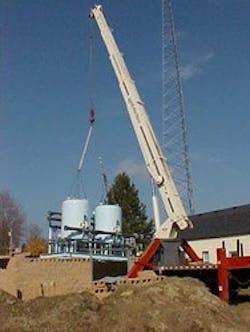Achieving Compliance Through Co-Precipitation
The city had arsenic levels as high as 12 parts per billion (ppb) on three of its wells. Jim Groose, Layne Christensen’s water treatment specialist, proposed the city install two treatment plants using co-precipitation, which is recognized as the best available technology for arsenic removal. The proposed systems were designed to use LayneOx , an efficient granular catalytic filter media with a naturally high manganese dioxide content. In one backwashable process, iron, manganese, hydrogen sulfide and arsenic are removed.
During pilot testing, the catalytic media performed at loading rates of both 7 and 10 gal per minute (gpm)/sq ft, far higher than the 10 States Standard of 3 gpm/sq ft. The final systems were designed to operate at 5 gpm/sq ft, enabling the systems to be installed with a much smaller footprint and to be housed in much smaller (and more economical) buildings.
The treatment plants were designed and constructed at Layne’s UL-certified fabrication facility in Bridgewater, N.J., which maintains an ASME “U” Code Stamp for construction of pressure vessels. The final installed design is comprised of two 200-gpm skid-mounted treatment plants, each with two 5-ft-diameter treatment vessels, one treating the groundwater from wells 3 and 4, and the other treating the water from well 10. The systems were among the first arsenic removal systems to be commissioned in Michigan and were the first ever to use LayneOx to co-precipitate arsenic.
In operation since December 2004, the systems are performing well, and arsenic in the treated water is maintained at compliant levels ranging from non-detectable to 4 ppb.
